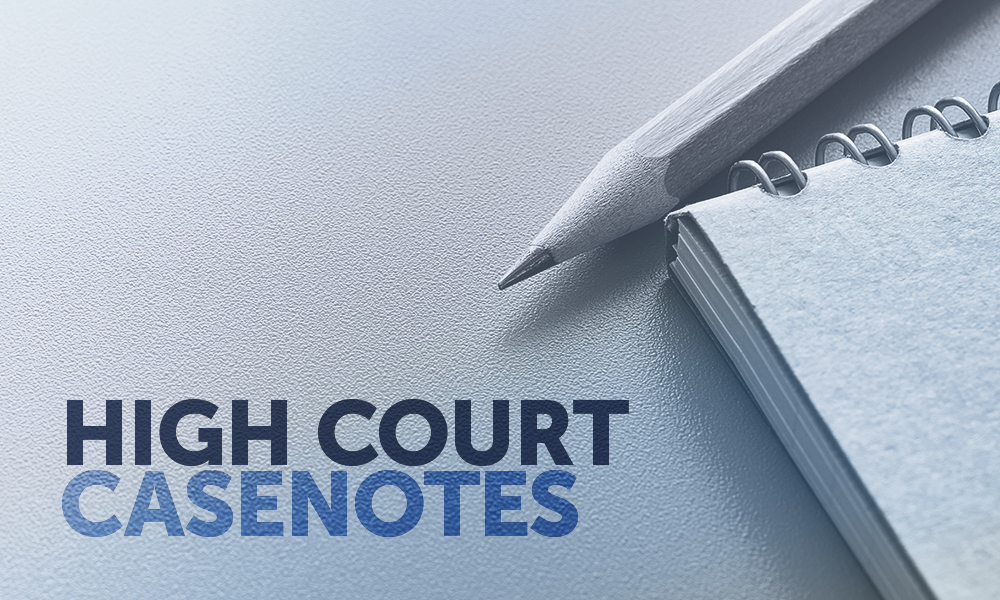In Alexander v Minister for Home Affairs [2022] HCA 19 (8 June 2022), the High Court was required to determine the validity of s36B of the Australian Citizenship Act 2007 (Cth) (Citizenship Act).
Section 36B of the Citizenship Act empowers the Minister for Home Affairs (the minister) to denationalise an Australian citizen, if the minister is satisfied that the person has “repudiated their allegience to Australia” by having engaged in “foreign incursions and recruitment”.
Before the minister can make such a determination, they must also be satisfied that it would be contrary to the public interest for the person to remain an Australian citizen, and that the person would not be rendered stateless by reason of the minister’s determination.
Section 36B, and its companion provisions, were introduced into the Citizenship Act in 2020 – notably after the events relied on by the minister to denaturalise Alexander, had occurred.
The plaintiff (Alexander) was born in Australia in 1986 and acquired Australian citizenship. He also acquired Turkish citizenship by descent because his parents were Turkish citizens.
In April 2013 Alexander left Australia for Turkey, and upon arriving travelled to Syria where he married his wife.
The Australian Security Intelligence Organisation reported it was likely that, by August 2013, Alexander had joined terrorist organisation ISIS, and engaged in foreign incursions and recruitment in Syria. In 2017, Alexander was apprehended and charged with offences against the Syrian Penal Code.
In 2019 Alexander was convicted and sentenced by a Syrian court to a term of imprisonment of 15 years. The term of imprisonment was subsequently reduced to five years following Alexander’s admissions during interrogation, allegedly under torture. Alexander was later pardoned but remained in detention because, among other things, he could not be released into the Syrian community or repatriated to Turkey.
After Alexander was detained in Syria, the relevant minister made several orders effectively preventing Alexander from re-entering Australia. Finally, on 2 July 2021, the minister determined, pursuant to s36B(1) of the Citizenship Act, that Alexander ceased to be an Australian citizen.
In July 2021, proceedings were commenced in the original jurisdiction of the High Court. Alexander’s sister was appointed his litigation guardian, and the parties filed a special case in which they agreed on a number of questions for the opinion of the Full Court of the High Court, as to the validity of s36B.
The questions included the following, the answers to which proved to be determinative of Alexander’s claim:
- whether s36B was invalid in its operation in respect of Alexander, because it is not supported by a head of Commonwealth legislative power
- whether s36B was invalid in its operation in respect of Alexander, because it reposes in the minister the exclusively judicial function of punishing criminal guilt.
In answer to the first question, a majority of the High Court (Gordon J thought an answer was unnecessary) found that s36B was supported by a head of Commonwealth legislative power – the power to make laws with respect to “naturalization and aliens” under s51(xix) of the Constitution (aliens power).
Conversely, on the second question, a majority of the High Court (Steward J dissenting) found that s36B did repose in the minister the exclusively judicial function of punishing criminal guilt, and was invalid on this basis.
Kiefel CJ, Keane and Gleeson JJ (Kiefel CJ et al) gave their reasons for their decision in a joint judgment, while the balance of the High Court opted to write their own judgments.
The first question
On the first question, Kiefel CJ et al were unconvinced by Alexander’s argument: that s36B was not supported by the aliens power in his application to him, because the aliens power was “spent” when he became an Australian citizen at birth, and Parliament could not make a law to transform a non-alien into an alien – that is, “once a citizen always a citizen”.
Their Honours considered, at [31], that citizenship is “a statutory concept”. Their Honours noted, at [32], that the Constitution did not contemplate that people would be, by virtue of their birth in Australia, indelibly Australian citizens. Instead, the Constitution leaves it to Parliament to decide who shall be granted the status of citizen and what citizenship entails.
Their Honours also observed, at [50], that “citizenship is a status of reciprocal rights and obligations” and, at [51], the facts stated in the special case suggest it was reasonably open to Parliament to regard Alexander’s voluntary conduct as “so reprehensible as to be incompatible with the common binds of allegiance to the Australian community”.
Their Honours considered, at [60]-[62], that this was so even if Alexander did not make a deliberate decision to repudiate his allegiance. Gageler J, at [98], agreed with Kiefel CJ et al.
Although Gordon J considered that it was unnecessary to answer this first question, she accepted, at [156], that the aliens power supported s36B – at least insofar as it is directed to conduct which constitutes renunciation of allegiance. Edelman J, at [229], agrees with Gordon J that the aliens power supports laws that regulate some circumstances in which a person can cease to be an Australian citizen.
Edelman J, at [232] and [233], also agrees with Steward J that a person, irrespective of any subjective intention, may sever his or her allegiance to the Australian political community by wrongdoing that is so extreme that it is inconsistent with continued membership of that community.
Steward J, at [289], observed that a law that denationalises a citizen because that person took a step that represented “a fundamental and lasting rebuttal of allegience to Australia”, would be authorised by and consistent with the historical consideration of the aliens power. And, at [301], Steward J considered that it was “easy to accept” that participation in certain types of terrorist activities could amount to conduct that is necessarily inconsistent with allegiance to Australia.
The second question
On the second question, Kiefel CJ et al observed, at [72], that exile has long been regarded as punishment and held, at [75] and [79]-[80], that the substantive effect of s36B is essentially punitive – retribution for conduct considered to be so reprehensible that it is inconsistent with shared values of the Australian community.
Kiefel CJ et al concluded, at [96], that the power to determine the facts to enliven the power to impose exile is one which, under Chapter III of the Constitution, is exercisable exclusively by a Federal Court. Gageler J, at [98], agreed with Kiefel CJ et al in both their conclusion on this second question and their reasoning.
Gageler wrote additionally on the task of identifying the legislative purpose of a law and observed that, in this case, the defendants were wrong to identify the legislative purpose by relying on certain extrinsic material.
Gordon J, like Kiefel CJ et al, also observed, at [167], that exile, historically, has been regarded as punishment. And Gordon J considered, at [163], that the purpose of s36B was retribution and concluded, at [173], that the section was contrary to Chapter III of the Constitution.
Edelman J, at [247], also considered that s36B had a punitive character and, at [253], that the section was invalid because it purported to confer exclusively judicial power on the executive. But Steward J, in dissent, held, at [332], that the minister’s powers under s36B was not a judicial power for three reasons.
First, Steward J observed that it has never been an essentially judicial function to make orders which denationalise a person. Second, Steward J observed, at [336], the task of the minister under s36B was not to determine whether the relevant conduct constituted a crime.
And third, Steward J considered, at [337], the purpose of s36B was not to punish, but rather to “recognise a person’s repudiation of his or her allegiance to Australia and to prescribe a consequence for this repudiation, namely denationalisation”.
Dr Michelle Sharpe is a Victorian barrister practising in general commercial, real property, disciplinary and regulatory law, 03 9225 8722, email msharpe@vicbar.com.au. The full version of these judgments can be found at austlii.edu.au.














Share this article